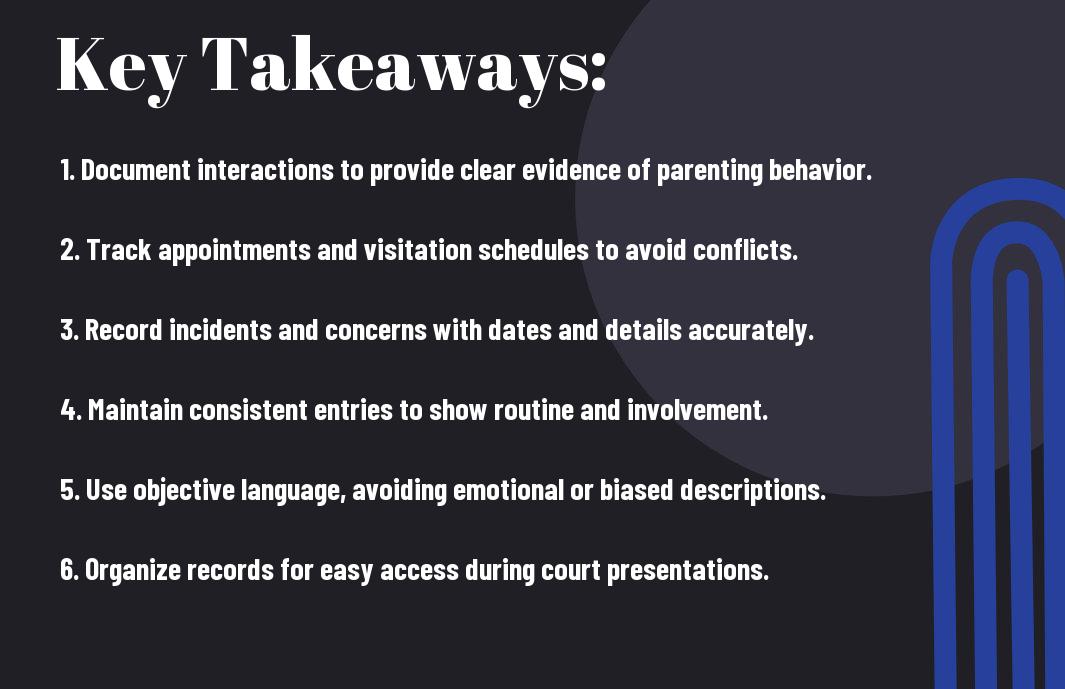With effective documentation, you can strengthen your case in child custody battles. Utilizing journals, calendars, and personal records allows you to compile important information regarding your child’s welfare, visitation schedules, and interactions with your co-parent. These tools provide concrete evidence that can support your position, ensuring that your child’s best interests remain the focus of any custody agreement. Incorporating organized records not only enhances your credibility but also empowers you to present an accurate picture to the court. Our experts at Digital Forensic Squad specialize in recording data for child custody battles.
Key Takeaways:
- Consistent documentation of interactions, schedules, and key events can provide valuable evidence in custody disputes.
- Maintaining a calendar can help track the child’s activities and important dates, ensuring a comprehensive overview of their life.
- Personal records can support claims regarding parental involvement and the child’s well-being, showcasing a proactive approach to parenting.
The Importance of Documentation in Child Custody
A comprehensive documentation strategy enhances your position in child custody cases. By keeping organized records of parenting time, communication with your ex-partner, and your child’s daily activities, you provide solid evidence that can significantly influence court decisions. Detailed documentation not only demonstrates your commitment to your child’s well-being but also serves to refute any unfounded claims made against you during custody proceedings.
Establishing a Parenting Schedule
Child custody disputes often hinge on a well-defined parenting schedule. By documenting your proposed schedule and adhering to it consistently, you portray reliability and dedication to your child’s needs. This can set a positive tone in negotiations and court discussions.
Monitoring Child Well-being
Between your parenting time and your child’s experiences, it is imperative to collect data that reflects their well-being. Keeping track of your child’s behavior, health, and emotional state can provide you with insights necessary for making informed decisions.
At the same time, lying about your child’s status or ignoring concerning signs can have dangerous implications. By documenting any changes in health, emotional fluctuations, or academic struggles, you can advocate effectively for your child’s best interests. Furthermore, documenting positive experiences, such as milestones or interactions with a supportive community, showcases your role as a caring and engaged parent. This balance of positive and negative aspects will give a clear picture of your child’s overall well-being, further strengthening your case in custody matters.

Types of Journals to Use
Some effective journal types can support your case in child custody battles:
| Daily Journals | Track events, daily interactions, and important observations. |
| Reflective Journals | Reflect on feelings, thoughts, and your child’s experiences. |
| Event Journals | Document significant events or incidents. |
| Behavior Journals | Monitor your child’s behavior and emotional state. |
| Support Journals | Record support received from family and friends. |
After choosing the journal type, you can effectively track the necessary information for your child custody case.
Daily Journals
Across the various journal types, daily journals stand out as they allow you to consistently record your child’s daily activities, interactions, and significant moments. Maintaining a daily log can help you create a factual narrative, providing insight into your child’s well-being and the dynamics of your relationship.
Reflective Journals
Types of reflective journals enable you to explore thoughts and feelings surrounding your parenting journey. You can understand the emotional aspects of your experiences with your child and the custody process. By identifying patterns and insights, you can articulate your parenting perspective effectively in court.
Considering the benefits of reflective journals, they help you lay bare your emotions, addressing the challenges you face and the reasons behind your choices. You can constructively showcase your child’s development and the positive support you provide, all while uncovering any dangerous dynamics that may require attention. Using these insights, you can develop a deeper understanding of your child’s needs, which can strengthen your case in custody discussions.
Utilizing Calendars Effectively
Keep a consistent schedule using calendars to document all relevant events, appointments, and communications related to your child custody case. This organized approach will help you showcase your commitment to your child’s well-being. For guidance on how to maintain a detailed record, check out How to Keep a Detailed Custody Journal.
Planning Visits and Activities
Activities planned with your child should be logged in your calendar to ensure you can demonstrate your engagement and involvement in their life during custody proceedings. This record can positively influence the court’s perception of your parenting commitment.
Tracking Child’s Important Events
After identifying and marking significant events such as birthdays, school performances, and medical appointments, you will have a comprehensive view of your child’s life milestones. By being proactive, you can provide evidence to support your custody case.
In addition, having an accurate log of these events helps to establish patterns of care and support. Highlight milestones and achievements in your child’s development, as it demonstrates your active involvement and dedication as a parent. Keeping a detailed record of positive experiences and even challenges can show the court your adaptability and commitment to your child’s best interests, reinforcing your role as a reliable and responsible caregiver.

Personal Records to Compile
Now, assembling personal records can play a significant role in your child custody battle. These documents provide a comprehensive view of your child’s well-being and development, which can be vital for demonstrating your parenting capabilities. Focus on collecting medical, educational, and behavioral records to build a strong case that supports your position as a loving and responsible parent.
Medical Records
On collecting medical records, ensure you obtain copies of your child’s health, immunization history, and any pertinent treatment documents. These records can provide insight into your child’s physical and mental health, showcasing any existing conditions that may require special attention. This information can help establish your understanding and management of your child’s healthcare needs.
School and Behavioral Records
Personal records related to your child’s schooling and behavioral history are vital for illustrating their development. This includes report cards, attendance records, and any disciplinary actions taken at school. These documents can establish your child’s educational progress and your involvement in their academic life.
In fact, having a complete record of your child’s academic achievements and behavioral patterns can highlight your active participation in their education. If there are any instances of disciplinary issues or special education needs, this information can showcase how you have addressed these challenges effectively. Additionally, positive reports and teacher feedback can reinforce that you provide a supportive environment for your child’s growth, potentially giving you a stronger position during negotiations or court proceedings.
Legal Considerations
After gathering your journals, calendars, and personal records, it’s imperative to understand their legal implications in child custody battles. Your documentation can be a powerful tool, helping you Manage Your Shared Child Custody Arrangement. However, it is vital to know how these records are viewed under family law to protect your interests.
Admissibility of Records in Court
Among the various considerations, your records must be admissible in court to be effective. Courts often require that personal documentation meets strict criteria, such as relevance and authenticity. Therefore, ensure that your records are well-organized and factual to avoid any challenges during proceedings.
Privacy and Confidentiality Issues
The nature of your records raises important privacy and confidentiality concerns. As you compile journals or calendars, you should be aware that some details could be sensitive and, if misused, may significantly affect your custody case.
This protection of sensitive information is imperative, especially when you share details about your child’s life. Leaking, even inadvertently, private exchanges or opinions about your ex-partner could potentially backfire in court. Additionally, the risk of having such sensitive content used against you is high, which is why you should ensure that your records are kept secure and private. Always be mindful of the fact that while documentation can support your custody case, it also needs to be managed with care to protect your interests and those of your child.
Strategies for Maintaining Accurate Records
For successful navigation through child custody battles, maintaining accurate records is key. This involves not only documenting pertinent information consistently but also organizing and securing your records for easy access. By implementing effective strategies, you can create a detailed and credible account of your parenting experiences, which can substantiate your case in custody discussions.
Consistent Documentation Habits
About developing consistent documentation habits, you should set aside dedicated time each week to record significant events, interactions, and any changes related to your child. This includes noting parenting schedules, communication with your co-parent, and any incidents that may affect custody arrangements. By establishing a routine, your records will remain comprehensive and reliable.
Organization and Accessibility
Along with consistent documentation, ensuring your records are well-organized and easily accessible is crucial. Utilize folders, both physical and digital, to categorize important documents, such as emails, messages, and incident reports. Clearly label your files, so you can quickly locate specific information when needed.
It is advisable to use a centralized system such as a cloud service or a dedicated physical binder for immediate access to your records. This way, you can quickly retrieve necessary information during critical moments in your case. Be sure to have sections for different types of records, highlighting dates and events prominently. Keeping your records organized will not only ease your documentation process but also enhance your credibility during custody negotiations or court hearings. Strong, clear records can significantly influence your case outcome.
To wrap up
From above, it’s clear that utilizing journals, calendars, and personal records can greatly enhance your position in child custody battles. By documenting interactions, schedules, and any significant events, you create a comprehensive narrative that showcases your involvement and commitment as a parent. These records serve not only as evidence but also help you present a well-organized case to the court. With careful attention to detail and a systematic approach, you can effectively support your arguments and priorities for your child’s well-being.
FAQ
Q: How can keeping a journal help during a child custody battle?
A: Maintaining a journal can be beneficial in documenting events, interactions, and your relationship with your child. It allows you to note significant occurrences, such as visitation exchanges, conversations with your child, and any notable changes in behavior or circumstances. This documentation can provide valuable insights to lawyers and the court by painting a comprehensive picture of your involvement in your child’s life and addressing any concerns about parenting practices.
Q: What role do calendars play in managing child custody arrangements?
A: Calendars are vital for tracking visitation schedules, important dates, and appointments related to your child. By maintaining an organized calendar, you can ensure that you adhere to custody agreements and have a clear record of when visits are scheduled or missed. This can later serve as evidence to support your case in court if disputes arise over compliance with the custody arrangement.
Q: How can personal records contribute to a successful custody case?
A: Personal records, such as financial documents, school reports, and medical histories, provide a comprehensive overview of your ability to support and raise your child. These records can demonstrate your level of involvement in their education and health, including attending parent-teacher meetings or medical appointments. Having concrete evidence of your commitment to your child’s wellbeing can strengthen your position in custody discussions and highlight your capability as a responsible parent.

